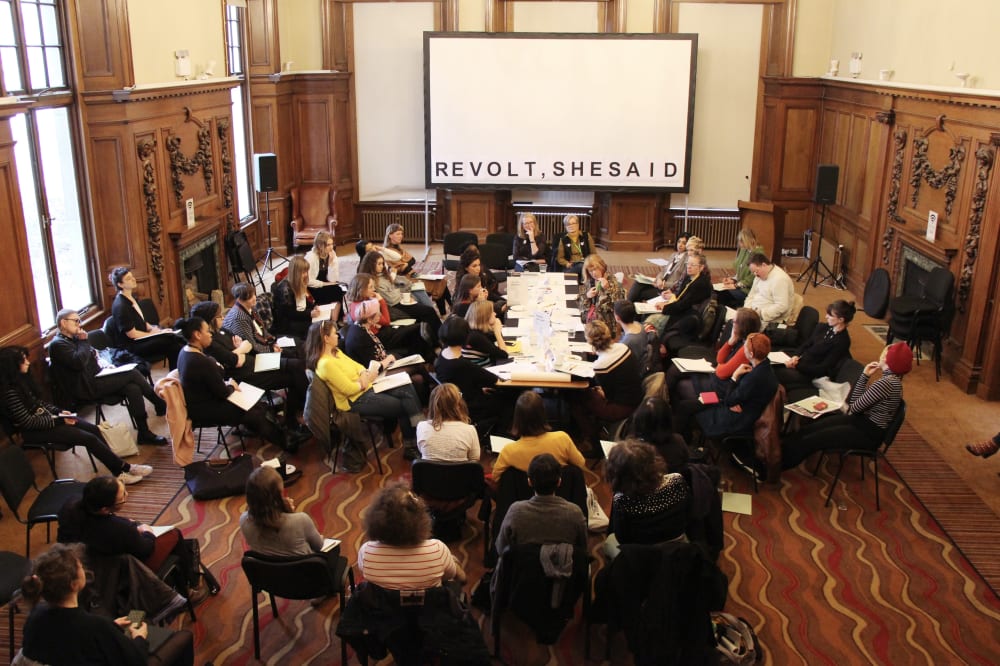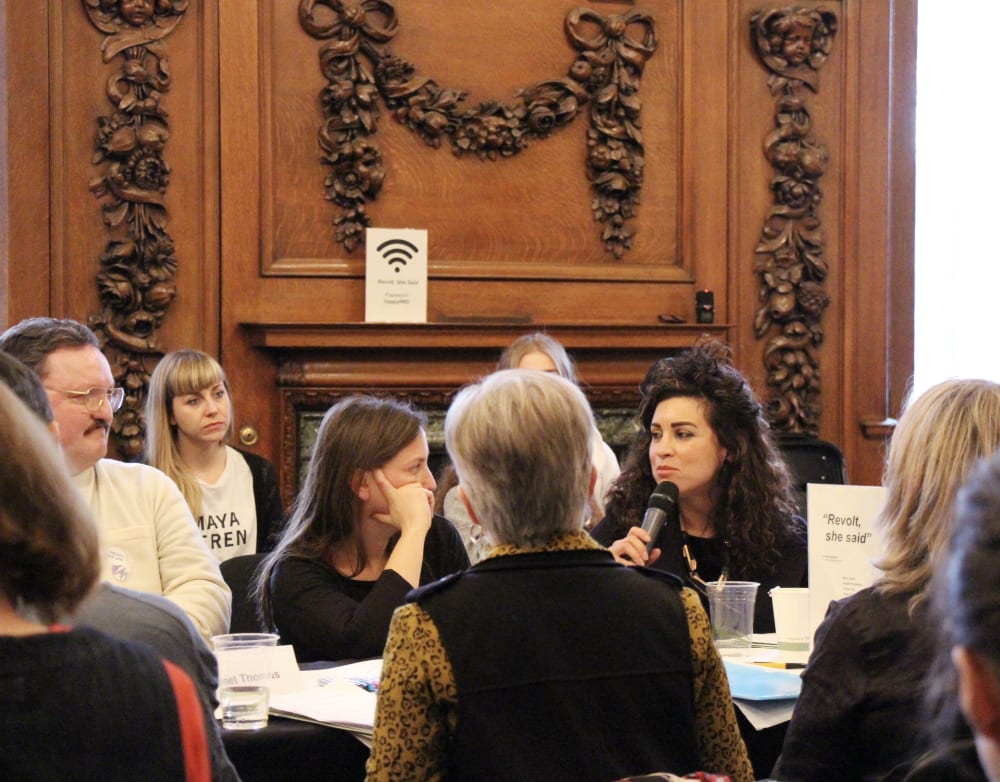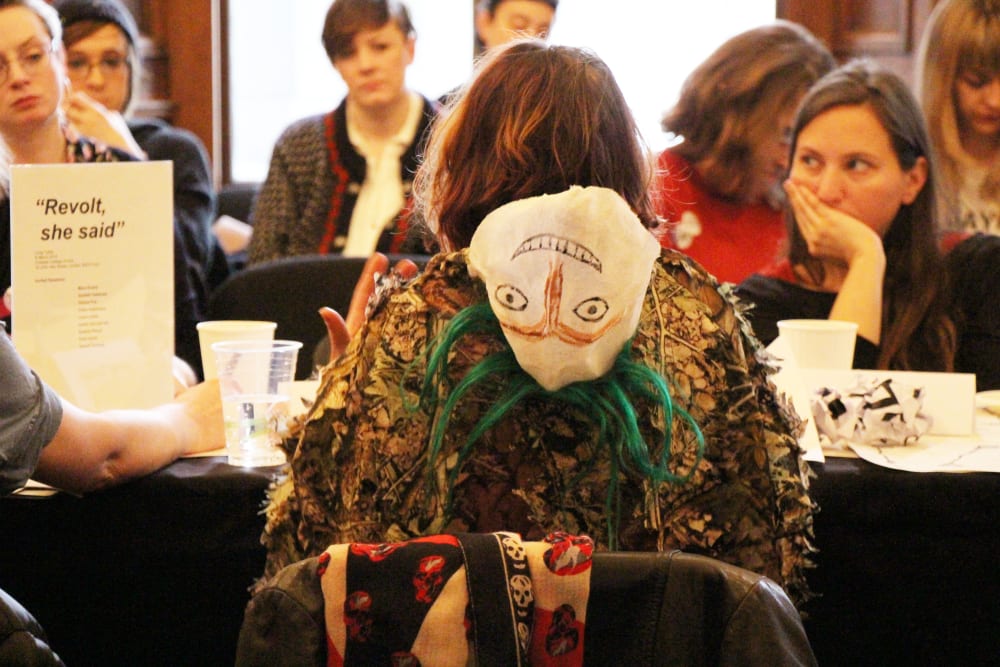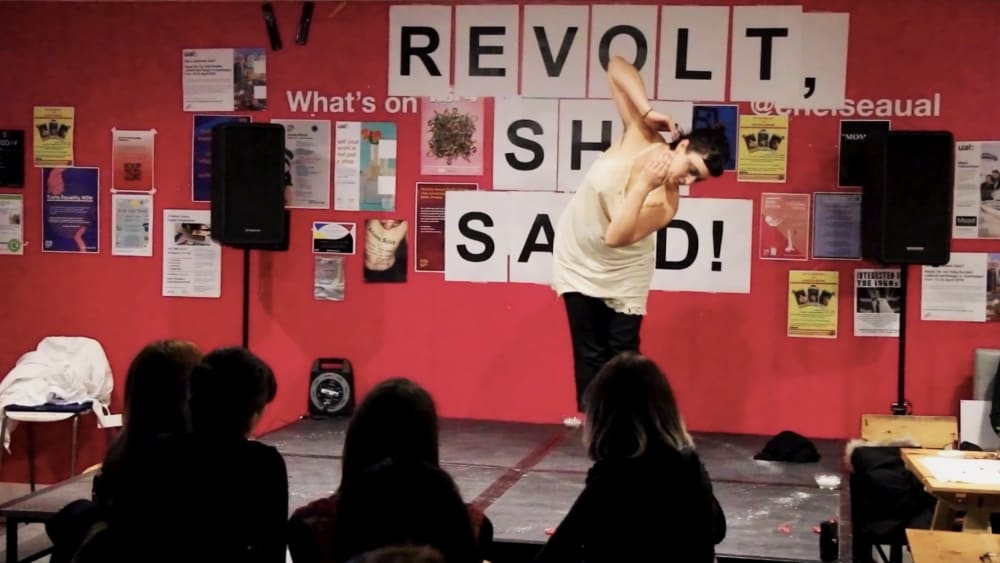For this Long Table event, the Subjectivity and Feminisms research group at Chelsea College of Arts, invited special guests, students and interested members of the public to discuss the antagonism between ‘revolt’ and ‘revolution’ in relation to making art. Is this antagonism inevitable? Or can there be productive alliances between the 2 forms of revolutionary subjectivity?
8 March 2019, Chelsea College of Arts

"Revolt, as I understand it—psychic revolt, analytic revolt, artistic revolt—refers to a permanent state of questioning, of transformations, an endless probing of appearances." - Julia Kristeva
In the short book of interviews 'Revolt, She Said' (2003), Julia Kristeva contrasts the original richness of the term ‘revolt’ to ‘revolution’ which she claims has been reduced to political rebellion. Revolt, rather than rebelling against one regime in order to overthrow it and establish a new order, is, for her, a continuous state of questioning. This questioning is on the side of exposing contradictions and undoing fixity and, most importantly, keeping this process in motion.

By contrast, she sees political revolutions as leading to a new order to which conformity is the inevitable outcome. Her advocation of ‘revolt’ as a kind of ‘psychical negativity’ is in contrast to the contemporary tendency to equate revolt to politics. She says: “to say that revolt is only politics is a betrayal of this vast movement. People have reduced, castrated and mutilated the concept of revolt by turning it only into politics” (p. 99).
Kristeva’s position seems to remain within a narrow Western European avant-garde framework, which is problematic in relation to transnational feminisms and the necessity of political change. For her: “to think is to revolt, to be in the movement of meaning and not the movement of the streets…” (p. 39). Does this then mean, as Adrian Johnston claims that ‘revolt as creative intellectual, artistic, or psychological thinking precludes revolution as political action’? Or can these movements be thought differently? Indeed, it is necessary to think them differently as, while art activisms have expanded globally and achieved much, patriarchal attitudes towards women still remain in place.
For artists interested in effecting change, but who also desire to express their own sensibility, contemporary political conditions can seem overwhelming. How might Kristeva’s concept of “revolt” offer hope to artists who are not necessarily activists, yet who are keen to effect change in attitudes towards the category of being ‘female’, a still marginalised position in patriarchal culture, the success of feminist movements notwithstanding?
While legislative change is necessary to the feminist ideals of equality and autonomy for all women, how can we think of revolutionary aesthetics both within and apart from activism? Or is a Kristevan process of “revolt” superfluous in an era of #MeToo?
Using Kristeva’s distinction between the terms “revolt” and “revolution” as a springboard to debate a perceived antagonism between activism and creativity, all audience members were encouraged to take up seats at the table and participate at the Long Table.

Invited contributors included:
- Mary Evans - London based artist and course leader of BA Fine Art, Chelsea College of Arts
- Dr Azadeh Fatehrad - Artist and Curator based at the School of Fine Art, History of Art and Cultural Studies, University of Leeds
- Dr Oriana Fox - Artist and para-academic whose work mixes sincerity and humour to explore the connections between truth-telling, nonconformity and wellbeing
- Sophia Phoca - Dean of Fine Art, Camberwell, Chelsea, Wimbledon
- Dr Lana Locke - artist working across a range of media and recent PhD student at Chelsea College of Arts
- Susan Pui San Lok - artist, writer and academic based in London
- Trish Scott - artist, curator and researcher
- Jennet Thomas - Reader in Time Based Media and Performance at Wimbledon College of Arts
- Helen Kaplinsky - London-based independent curator and writer
You can hear their opening statements below. The rest of the discussion was not recorded.
“Revolt, She Said” Cabaret

To celebrate the International Women’s Day at Chelsea College of Arts, the long table was followed by “Revolt, She Said” Cabaret, which included the following acts by UAL students and members of Subjectivity and Feminisms Research Group at Chelsea College of Arts:
- Denise Ackerl - Wannabe Brexit
- Philippa Weaver - ‘and so the woolf said…’ [sic]
- Kadian Gosler - Undressing to Address Mature Female Sexuality
- Stephanie Spindler - I like to blow my own horn; mouth to junk resuscitation.
- Basak Ulu - Crippled sorority
- Annie Romi - If call it a Revolt! Revolt it is.
- Fran Cottell - FRONT
- Shengyi Liu - Cycle
- Elin Karlsson - The Jam in Bellfield
- Yunyao Hu - Woman’s pain
- Sara True - A Girl called Room
- Rosemary Cronin - Out in the starlight
- Thea Laang - A Woman Who
- Catherine Maffioletti - Major Abnormalities
- Maria Walsh - Channelling Kathy Acker channelling Erica Jong
Subjectivity and Feminisms - Catwalk
Convened by Dr Mo Throp and Dr Maria Walsh and the Subjectivity and Feminisms Research Group at Chelsea College of Arts.
Subjectivity and Feminisms Research Group includes: Denise Ackerl, Remi Allen, Cecile Emmanuelle Borra, Jo Bruton, Fran Cottell, Rosemary Cronin, Dr Jozefina Komporaly, Dr Morna Laing, Dr Lana Locke, Dr Ope Lori, Dr Catherine Maffioletti, Dr Rosa Nogues, Stephanie Spindler, Dr Mo Throp, Dr Maria Walsh.